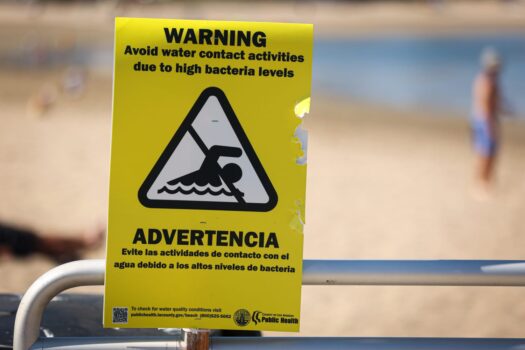Officers in at the very least 10 states have closed seashores or warned individuals to not swim within the water as a consequence of excessive micro organism ranges forward of the Fourth of July vacation.
A number of the closures are associated to micro organism from fecal waste, whereas others are as a consequence of excessive ranges of cyanobacteria, also called blue-green algae, that’s present in freshwater.
Florida, Illinois, Michigan, New Jersey and New York have every reported unsafe ranges of fecal waste at sure seashores within the final week. Illinois has issued advisories for 16 seashores, and Michigan has introduced two beach closures and five swimming advisories.
In Vermont, six locations are on high alert as a consequence of extra quantities of cyanobacteria, so the state is telling individuals to not swim there.
Many seashores throughout the U.S. shut every year for dangerous ranges of micro organism. Atmosphere America, an environmental analysis and coverage heart, discovered that more than half of the beaches examined skilled at the very least someday with unsafe ranges of fecal contamination in 2022 primarily based on the Environmental Safety Company’s requirements.
Swimming in waters with high bacteria levels could cause gastrointestinal sickness and pores and skin infections, particularly amongst kids, older individuals and people with weakened immune methods.
Analysis means that cyanobacterial algal blooms are happening more frequently as a consequence of local weather change, and publicity to them could trigger lifelong well being issues. Cyanobacteria produce microcystin, a toxin which will injury the kidneys, liver or reproductive system if consumed in excessive quantities.
As of Friday, Iowa was seeing excessive ranges of microcystin at two seashores and excessive ranges of E. coli at 5 others.
In Massachusetts, 34 beaches have closed, largely as a consequence of excessive ranges of E. coli or enterococci — forms of micro organism that sign the presence of fecal waste. Enterococcus is measured in each marine and freshwater, whereas E. coli is measured solely in freshwater.
Robert Goldstein, commissioner of Massachusetts’ Division of Public Well being, mentioned the spike in micro organism ranges is frequent within the state after a heavy rainfall. Rain water picks up micro organism from the setting, similar to from animal or human excrement, then carries it into our bodies of water.
“After heavy rains, which we’ve had right here within the Northeast over the previous couple of weeks, there’s a rise within the variety of seashores that should be closed,” Goldstein mentioned.
Round 5% of seashores in Massachusetts are closed all through the season, Goldstein estimated. The present closures symbolize solely a small fraction of the state’s 1,100 public and semi-public seashores, he added.
The Florida Division of Well being additionally decided that a number of beaches in Monroe and Hillsborough counties have poor water high quality as a consequence of excessive ranges of enterococci.
In San Diego, three seashores have closed and two have warnings as a consequence of unsafe micro organism ranges. And in southeast Virginia, several sites are under a similar advisory.
Goldstein mentioned micro organism ranges can change regularly, so individuals ought to test their well being division’s web site for the newest updates on the place it’s secure to swim and maintain a lookout for security warnings on the seashore.
Individuals may also take motion to attenuate the quantity of micro organism they add to the setting. Goldstein urged that beachgoers clear up after their pets and correctly eliminate trash, each of which may restrict animal feces from coming into the water.
“No matter micro organism that they’re introducing into the setting, that micro organism is probably going, after a heavy rainfall, to finish up within the our bodies of water round us,” he mentioned.





